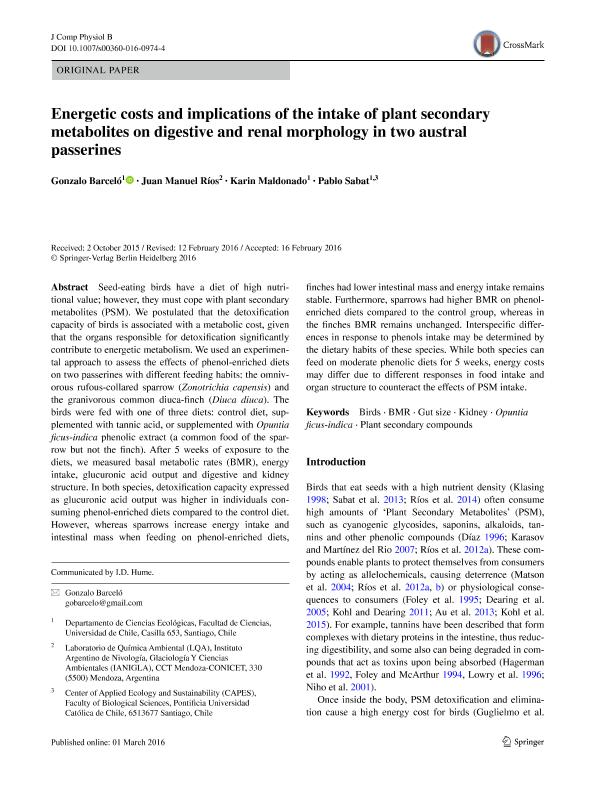Mostrar el registro sencillo del ítem
dc.contributor.author
Barceló, Gonzalo
dc.contributor.author
Rios, Juan Manuel

dc.contributor.author
Maldonado, Karin
dc.contributor.author
Sabatino, Pablo

dc.date.available
2018-09-12T20:08:57Z
dc.date.issued
2016-07
dc.identifier.citation
Barceló, Gonzalo; Rios, Juan Manuel; Maldonado, Karin; Sabatino, Pablo; Energetic costs and implications of the intake of plant secondary metabolites on digestive and renal morphology in two austral passerines; Springer Heidelberg; Journal of Comparative Physiology B: Biochemical, Systems and Environmental Physiology; 186; 5; 7-2016; 625-637
dc.identifier.issn
0174-1578
dc.identifier.uri
http://hdl.handle.net/11336/59431
dc.description.abstract
Seed-eating birds have a diet of high nutritional value; however, they must cope with plant secondary metabolites (PSM). We postulated that the detoxification capacity of birds is associated with a metabolic cost, given that the organs responsible for detoxification significantly contribute to energetic metabolism. We used an experimental approach to assess the effects of phenol-enriched diets on two passerines with different feeding habits: the omnivorous rufous-collared sparrow (Zonotrichia capensis) and the granivorous common diuca-finch (Diuca diuca). The birds were fed with one of three diets: control diet, supplemented with tannic acid, or supplemented with Opuntia ficus-indica phenolic extract (a common food of the sparrow but not the finch). After 5 weeks of exposure to the diets, we measured basal metabolic rates (BMR), energy intake, glucuronic acid output and digestive and kidney structure. In both species, detoxification capacity expressed as glucuronic acid output was higher in individuals consuming phenol-enriched diets compared to the control diet. However, whereas sparrows increase energy intake and intestinal mass when feeding on phenol-enriched diets, finches had lower intestinal mass and energy intake remains stable. Furthermore, sparrows had higher BMR on phenol-enriched diets compared to the control group, whereas in the finches BMR remains unchanged. Interspecific differences in response to phenols intake may be determined by the dietary habits of these species. While both species can feed on moderate phenolic diets for 5 weeks, energy costs may differ due to different responses in food intake and organ structure to counteract the effects of PSM intake.
dc.format
application/pdf
dc.language.iso
eng
dc.publisher
Springer Heidelberg

dc.rights
info:eu-repo/semantics/openAccess
dc.rights.uri
https://creativecommons.org/licenses/by-nc-sa/2.5/ar/
dc.subject
Birds
dc.subject
Bmr
dc.subject
Gut Size
dc.subject
Kidney
dc.subject
Opuntiaficus-Indica
dc.subject
Plant Secondary Compounds
dc.subject.classification
Meteorología y Ciencias Atmosféricas

dc.subject.classification
Ciencias de la Tierra y relacionadas con el Medio Ambiente

dc.subject.classification
CIENCIAS NATURALES Y EXACTAS

dc.subject.classification
Otras Ciencias Biológicas

dc.subject.classification
Ciencias Biológicas

dc.subject.classification
CIENCIAS NATURALES Y EXACTAS

dc.title
Energetic costs and implications of the intake of plant secondary metabolites on digestive and renal morphology in two austral passerines
dc.type
info:eu-repo/semantics/article
dc.type
info:ar-repo/semantics/artículo
dc.type
info:eu-repo/semantics/publishedVersion
dc.date.updated
2018-09-12T13:59:48Z
dc.journal.volume
186
dc.journal.number
5
dc.journal.pagination
625-637
dc.journal.pais
Alemania

dc.journal.ciudad
Heidelberg
dc.description.fil
Fil: Barceló, Gonzalo. Universidad de Chile; Chile
dc.description.fil
Fil: Rios, Juan Manuel. Consejo Nacional de Investigaciones Científicas y Técnicas. Centro Científico Tecnológico Conicet - Mendoza. Instituto Argentino de Nivología, Glaciología y Ciencias Ambientales. Provincia de Mendoza. Instituto Argentino de Nivología, Glaciología y Ciencias Ambientales. Universidad Nacional de Cuyo. Instituto Argentino de Nivología, Glaciología y Ciencias Ambientales; Argentina
dc.description.fil
Fil: Maldonado, Karin. Universidad de Chile; Chile
dc.description.fil
Fil: Sabatino, Pablo. Universidad de Chile; Chile. Pontificia Universidad Católica de Chile; Chile
dc.journal.title
Journal of Comparative Physiology B: Biochemical, Systems and Environmental Physiology

dc.relation.alternativeid
info:eu-repo/semantics/altIdentifier/doi/https://dx.doi.org/10.1007/s00360-016-0974-4
dc.relation.alternativeid
info:eu-repo/semantics/altIdentifier/url/https://link.springer.com/article/10.1007/s00360-016-0974-4
Archivos asociados
